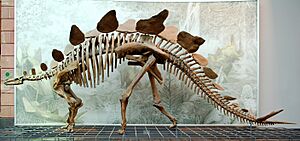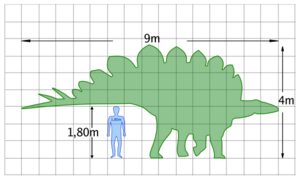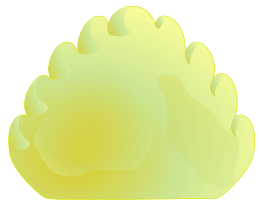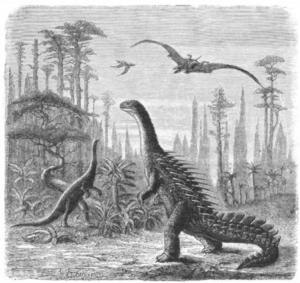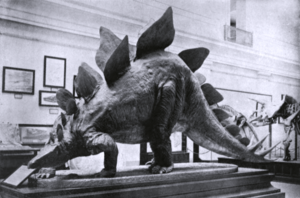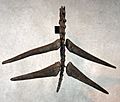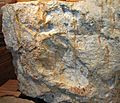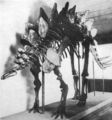Stegosaurus facts for kids
Quick facts for kids StegosaurusTemporal range: Upper Jurassic, 155 – 145 mya
|
|
|---|---|
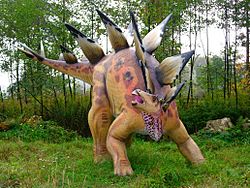 |
|
| Model Stegosaurus, Bałtów Jurassic Park, Poland. | |
| Scientific classification | |
| Kingdom: | |
| Phylum: | |
| Class: | |
| Superorder: | |
| Order: | |
| Suborder: | |
| Infraorder: | |
| Family: | |
| Genus: |
Stegosaurus
Marsh, 1877
|
Stegosaurus (which means "roof-lizard") was a large plant-eating dinosaur. It lived in what is now western North America.
This amazing dinosaur lived during the Upper Jurassic period. This was about 155 to 145 million years ago. Stegosaurus is easy to recognize. It had two rows of kite-shaped plates on its back. It also had long spikes on its tail. These spikes and plates helped protect it. It lived alongside fierce meat-eaters like Allosaurus and Ceratosaurus.
Contents
Discovering the Stegosaurus
Scientists first found Stegosaurus fossils in 1877. Othniel Charles Marsh named it from bones found near Morrison, Colorado. These first bones led to the naming of the first Stegosaurus type: Stegosaurus armatus.
Many different types of Stegosaurus have been found.
- Stegosaurus armatus: This was the first type discovered. Scientists have found over thirty skeletons of this species. It had four tail spikes and small plates. At 9 meters (30 feet), it was the longest Stegosaurus species.
- Stegosaurus stenops: Marsh named this type in 1887. It was found near Cañon City, Colorado. This is the most famous Stegosaurus species. We have at least one complete skeleton of it. It had large, wide plates and four tail spikes. S. stenops was shorter than S. armatus, growing to about 7 meters (23 feet).
- Stegosaurus longispinus: We know this type from one incomplete skeleton. S. longispinus had very long tail spikes. It was also about 7 meters (23 feet) long.
How Stegosaurus Lived
Stegosaurus was the biggest of the stegosaur family. It could grow up to 12 meters (39.4 feet) long. It weighed as much as 5,000 kilograms (5.5 tons). However, most were usually 7 to 9 meters long.
Its Head and Diet
The skull of Stegosaurus was long and thin. Its front legs were short. This meant its head was close to the ground, about 1 meter (3.3 feet) high. Because of this, it ate plants that grew low to the ground. It did not have front teeth. Instead, it had a beak covered in horn. Its chewing teeth were small and shaped like triangles. They did not grind food much.
Its Brain and Nerves
People often say the Stegosaurus brain was the size of a walnut. But it was actually several times bigger than a walnut. It also had a large group of nerves near its tail. These nerves helped control the back of its body. Some people even called this a "second brain." You can learn more about this in Dinosaur brains and intelligence.
How it Stood
Stegosaurus had very short front legs compared to its back legs. Its back legs had three short toes. Its front legs had five toes. All four legs had pads behind the toes to help support its weight.
Stegosaurus in Pop Culture
Stegosaurus is one of the most famous dinosaurs. You can see it in movies, cartoons, comics, and as toys. For a long time, scientists only had small pieces of Stegosaurus fossils. This made it hard to draw what it really looked like.
An early drawing of Stegosaurus was made in 1884. It showed the dinosaur standing on two legs with a long neck. It also had spikes all over its back and tail. This drawing was not very accurate.
In 1891, Marsh published a more correct drawing of the Stegosaurus skeleton. Soon, Stegosaurus became one of the most drawn dinosaurs. Artist Charles R. Knight made his first drawing in 1897. It showed a single row of plates. Later, he drew it with a double row of plates. This drawing was used to create the puppet in the 1933 movie King Kong.
Stegosaurus made its first big public appearance as a paper model in 1904. This model had the double row of plates. It was shown at big events before moving to the Smithsonian National Museum of Natural History.
Recently, on July 17, 2024, a large Stegosaurus skeleton called "Apex" was sold. It went for $44.6 million (£34 million) at an auction in New York City. This was the most money ever paid for a fossil!
Images for kids
-
Type specimen of S. stenops on display at the National Museum of Natural History.
-
Adult and juvenile S. stenops mounted as if under attack from an Allosaurus fragilis, Denver Museum of Nature and Science
-
Back plate cast, Museum of the Rockies
See also
 In Spanish: Stegosaurus para niños
In Spanish: Stegosaurus para niños
 | Emma Amos |
 | Edward Mitchell Bannister |
 | Larry D. Alexander |
 | Ernie Barnes |


